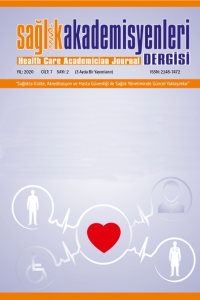Öz
This article is not about love, as the title may suggest, but about the diseases that attack the heart. Early studies have established beyond doubt that there are socioeconomic differences in disease causation. These differences are especially prominent with respect to cardiac problems and other non-communicable diseases. Current evidence from high-income countries shows that biological, behavioural and psychosocial risk factors present in disadvantaged communities accentuate the link between cardiovascular disease (CVD) and socio-economic Status1. But these issues do not just affect high-income countries. The cultural changes in upper- and lower- middle-income countries due to increasing urbanization and globalization could be generating new risk factors.
Kaynakça
- Schultz, William M., Heval M. Kelli, John C. Lisko et al. Socioeconomic Status and Cardio Vascular Outcomes: Challenges and Interventions. Circulation 2018 May; 137 (20): 2166–2178.
- Hotez PJ and L. Peiperl. Noncommunicable Diseases: A Globalization of Disparity? PLoS Med. 2015 Jul; 12 (7): e1001859. Nayar KR, Shaffi M, Kamaruddin M, Gopal PM, Grace C, George L. The ‘Without Syndrome’: A qualitative exploration of Diabetes in Kerala. Journal of Health Systems. 2017; 24 (2):14–6.
- Kutty, V R. Cohorts in chronic disease research: experiences from the PRO-LIFE cohort, Varkala, South India. BMC Proceedings 20137 (Suppl 5): O7 https://doi.org/10.1186/1753-6561-7-S5-O7
- Okello E, B Kakande, El Sebatta et. al. Socioeconomic and Environmental Risk Factors among Rheumatic Heart Disease Patients in Uganda. PLoS One. 2012; 7(8): e43917.
Öz
This article is not about love, as the title may suggest, but about the diseases that attack the heart. Early studies have established beyond doubt that there are socioeconomic differences in disease causation. These differences are especially prominent with respect to cardiac problems and other non-communicable diseases. Current evidence from high-income countries shows that biological, behavioural and psychosocial risk factors present in disadvantaged communities accentuate the link between cardiovascular disease (CVD) and socio-economic Status1. But these issues do not just affect high-income countries. The cultural changes in upper- and lower- middle-income countries due to increasing urbanization and globalization could be generating new risk factors.
Kaynakça
- Schultz, William M., Heval M. Kelli, John C. Lisko et al. Socioeconomic Status and Cardio Vascular Outcomes: Challenges and Interventions. Circulation 2018 May; 137 (20): 2166–2178.
- Hotez PJ and L. Peiperl. Noncommunicable Diseases: A Globalization of Disparity? PLoS Med. 2015 Jul; 12 (7): e1001859. Nayar KR, Shaffi M, Kamaruddin M, Gopal PM, Grace C, George L. The ‘Without Syndrome’: A qualitative exploration of Diabetes in Kerala. Journal of Health Systems. 2017; 24 (2):14–6.
- Kutty, V R. Cohorts in chronic disease research: experiences from the PRO-LIFE cohort, Varkala, South India. BMC Proceedings 20137 (Suppl 5): O7 https://doi.org/10.1186/1753-6561-7-S5-O7
- Okello E, B Kakande, El Sebatta et. al. Socioeconomic and Environmental Risk Factors among Rheumatic Heart Disease Patients in Uganda. PLoS One. 2012; 7(8): e43917.
Ayrıntılar
| Birincil Dil | İngilizce |
|---|---|
| Konular | Sağlık Kurumları Yönetimi |
| Bölüm | Editöre Mektup |
| Yazarlar | |
| Yayımlanma Tarihi | 30 Haziran 2020 |
| Kabul Tarihi | 5 Nisan 2020 |
| Yayımlandığı Sayı | Yıl 2020 Cilt: 7 Sayı: 2 |



